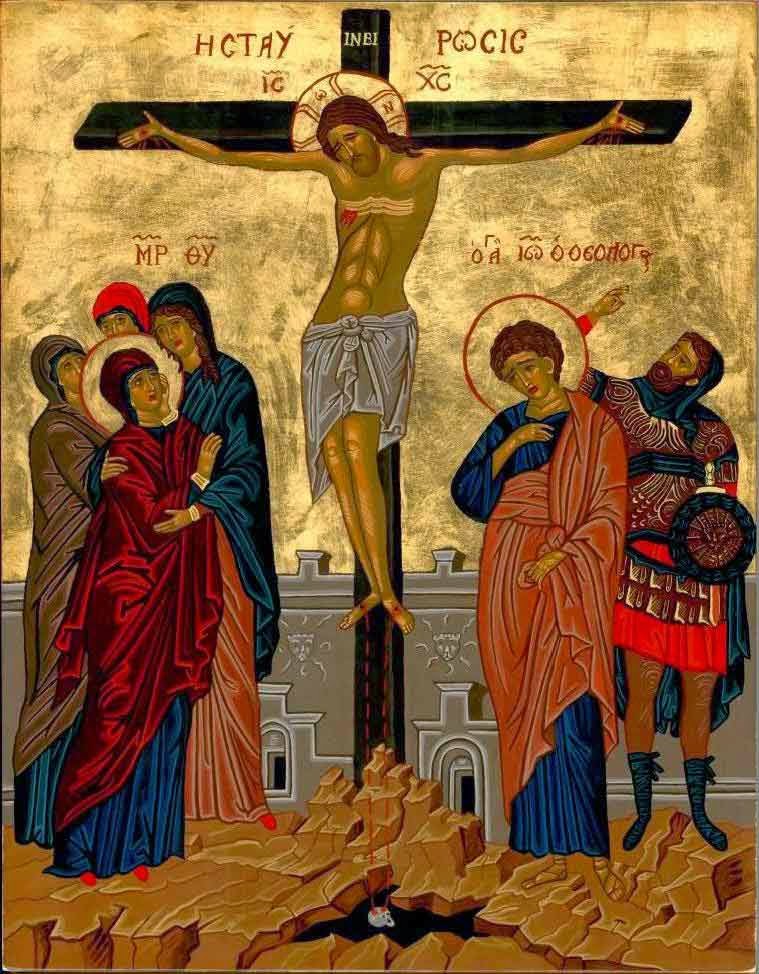Here's the hymntext:
O blessed John, the Master's friend,
The Forerunner of Christ,
At Jordan's stream, you touched the head
Beyond all nature's price.
By your sincere and constant pray'r,
Raise my soul to the Lord,
Put out the flames of passion's fire
That Christ be e'er adored.
You spring from parents' barren loins,
The Master's garden chaste,
The Baptist of the Christ, our Lord,
And glory of our race.
We praise you, great Forerunner John,
O guardian of our life:
Repel the Serpent's fierce attacks
Defend us in all strife.
First came the lamp, and then the Light;
First voice, and then the Word.
The Bridegroom's friend, and then the Groom;
His endless cry is heard:
Repent, O people, change your ways,
The Bridegroom will appear!
Cast sin aside, and safely bide,
Seek Christ in faith and fear!
One of the things I so love about the Byzantine tradition is its endless resourcefulness as a treasure trove of hidden Christian gems like this hymn. There are various threads in the text from which one could contemplate the implications of biblical truth, but here I'll just select one to meditate on.
The faithful request St John in the first stanza to, through his prayers, "Put out the flames of passion's fire." This is probably a reference to the ascetical tradition of the ancient Jewish Essenes, a sect which many believe John the Baptist belonged to. They lived in the wilderness in order to set themselves apart from the world and practice renunciation of fleshly desires to better set their desire on God alone. Even the few but graphic details the New Testament give of the Baptist's life illustrate this type of lifestyle, whether or not St John was truly an Essene.
In fact, to this day, St John the Baptist is looked to as a model of such a lifestyle, called "ascetical" by our language and practiced by millions of monks, nuns, and other Christians the world over and across denominations. Thus, St John is invoked to aid the believer in his struggle against fleshly desire, as a model of having struggled well.
But this all sounds very abstract. What in the world do monks and nuns and Essenes have to do with the ordinary 21st century man or woman, anyway?
In a word, everything.
You see, the heart of asceticism, which is self-denial for the sake of Christ (and in imitation of His loving sacrifice), is the antidote to our world's problems. One of the most widespread and devastating realities of our day is sexual misbehavior, especially sexual abuse and its relative, pornography use. Countless children, even before their teenage years, are getting caught up in a culture of sexting, where a young girl's calling card in the dating game is a naked selfie, sent to potential significant others so they may evaluate, in comparison to other young girls, of course, whether she is a viable girlfriend.
From these young children even to many among the elderly, sexual selfishness is the norm. Dating and marriage are about fulfilling my "needs." From a young age, we are led to believe that everyone carries around with them irrepressible "needs" for sexual satiation on demand, according to their tastes, whatever they may be--as long as it's not pedophiliac in nature, of course, but who's to say how long that arbitrary restriction will last?
This is what our culture has become, and it's destroying everyone. The rate of rape and other sexually forceful crimes is increasing beyond imagination, and the rate of pornography addiction is vastly larger still, and its newest viewers are younger by the day.
As a Christian, I believe the answer to all this, of course, is Jesus.
But Jesus how?
Jesus in his saints, that's how. In St Zechariah and St Elizabeth's chaste and faithful union with one another. In their son John's and their cousin Mary's virginal chastity, and in the millions of celibate and married Christians who have dedicated their lives to God and their families exclusively.
The Sexual Revolution shunned sexual exclusivity, yet the Church continued to embrace consecrated celibacy.
Western culture has exported sexual promiscuity to all the corners of the globe, while the Church has championed the reservation of the sexual act only to a marriage between one man and one woman, open to children.
The world is reaping the consequences of its decision, with sex-slavery and other forms of sexual exploitation at an all-time high.
But there are Christians still remaining faithful to their spouses and their Lord, and raising children to do the same. They are the happy ones.
You see, beauty and goodness still spring from only self-sacrificial love, from a Roman cross, and they bloom and create joy and peace in the lives of those who love and serve and imitate the Messiah who died thereon.
It's not easy; we've all been warped by the culture surrounding us. But, we have the power of God and the prayer of the Church on our side, we are growing in holiness by Christ's grace, and victory will be ours in the end.
So we continue to pray to St John the Baptist, and invite the world to join us:
"Put out the flames of passion's fire That Christ be e'er adored!"

